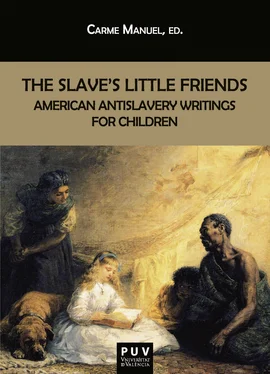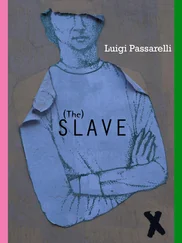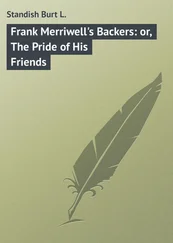——. “Jumbo and Zoiree.” Juvenile Miscellany 5.3 (January-February 1831): 285-299. Reptd. in Carolyn L. Karcher, ed., A Lydia Maria Child Reader . Durham, North Carolina: Duke University Press, 1997. 153-159.
——. “Jan and Zaida.” The Online Archive of Nineteenth-Century U.S. Women’s Writings. Ed. Glynis Carr. Online. Internet. http://www.facstaff.bucknell.edu/gcarr/19cUSWW/LB/J&Z.html.
Colman, Julia & Mathilda G. Thompson. The Child’s Anti-Slavery Book: Containing a Few Words about American Slave Children. And Stories of Slave Life . Ten Illustrations. New York: Carlton & Porter, 1859.
——. “Mary French and Susan Preston.” Juvenile Miscellany 6.3 (May-June 1834): 186-202.
Darton, William. Little Truths Better Than Great Fables. Containing Information on Divers Subjects for the Instruction of Children . Philadelphia, 1800.
Day, Thomas. The History of Sandford and Merton . 1783. New York: Worthington, 1887.
Douglass, Frederick. “ The Young Abolitionist .” The North Star (December 8, 1848): 2. https://lccn.loc.gov/sn84026365)
Edgeworth, Maria. “The Grateful Negro.” Popular Tales . 1804. 419-441.
Fee, Matilda Hamilton. “Selling Babies (Children’s Department).” American Missionary III.4 (March 1859): 67-68
——. “A Mother in Prison (Children’s Department).” American Missionary . III.4 (April 1859): 92.
Follen, Eliza Lee Cabot. The Liberty Cap . Boston: Leonard C. Bowles, 1846.
——. “To Mothers in the Free States.” New York: American Anti-Slavery Society, 1855. 1-4. Anti-Slavery Tracts Series 1; Nos. 1-20, 1855-1856. Tract No. 8.
Grosvenor, Horace C. The Child’s Book on Slavery, or, Slavery Made Plain . Cincinnati: American Reform Tract Book Society, 1857.
Jones, Jane Elizabeth. The Young Abolitionists; or Conversations on Slavery . Boston: The Anti-Slavery Office, 1848.
——. “J. Elizabeth Jones’ ‘The Wrongs of Woman.’ Delivered before the Ohio Women’s Convention, at Salem, April 19th, 1850.” The Salem, Ohio 1850 Women’s Rights Convention Proceedings . Compiled and edited by Robert W. Audretsch. Salem, Ohio: Salem Public Library, 1976. 52-62.
Lundy, Benjamin. The Poetical Works of Elizabeth Margaret Chandler, With A Memoir of Her Life and Character , Philadelphia: Lemuel Howell, 1836.
May, Samuel J. Some Recollections of our Antislavery Conflict . Boston: Fields, Osgood, & Co., 1869.
More, Hannah. The Black Prince, a True Story; Being an account of the Life and Death of Naimbanna, an African King’s Son, Who arrived in England in the Year 1791, and set Sail on his Return in June 1793 . Cheap Repository Tract 37. Philadelphia: B. & J. Johnson, 1800.
Mott, Abigail, ed. The Life and Adventures of Olaudah Equiano; or Gustavus Vassa, the African: From an Account Written by Himself. Abridged by Abigail Mott; To which are Added Some Remarks on the Slave Trade, &c . New York: Samuel Wood & Sons, 1829.
The Proceedings of the Woman’s Rights Convention, held at Syracuse, September 8th, 9th, & 10th,1852 . Syracuse: Printed by J.E. Masters.
Preston, Ann. Cousin Ann’s Stories for Children . Philadelphia: J.M. McKim, 1849.
Smith, Margaret Bayard. “Old Betty.” American Mother, Or, The Seymour Family . 1823.
Stearns, Charles. Narrative of Henry Box Brown, Who Escaped from Slavery, Enclosed in a Box 3 Feet Long and 2 Wide. Written from a Statement of Facts Made by Himself. With Remarks Upon the Remedy for Slavery . Boston: Brown and Stearns, 1849.
Townsend, Hannah and Mary Townsend. The Anti-Slavery Alphabet . Philadelphia Anti-Slavery Fair, 1846.
Wakefield, Priscilla. A Family Tour Through the British Empire: Containing Some Account of Its Manufactures, Natural and Artificial Curiosities, History and Antiquities; Interspersed with Biographical Anecdotes Particularly Adapted to the Amusement and Instruction of Youth . London: Darton and Harvey, 1804.
——. Excursions in North America: Described in Letters from a Gentleman and His Young Companion, to Their Friends in England . London: Darton and Harvey, 1806.
Walker, Jonathan. A Picture of Slavery for Youth. By the Author of “The Branded Hand” and “Chattelized Humanity.” Boston: J. Walker and W.R. Bliss, 184[?].
——. Trial and Imprisonment of Jonathan Walker, at Pensacola, Florida, for Aiding Slaves to Escape from Bondage . Boston: The Anti-Slavery Office, 1845.
Secondary works
Abruzzo, Margaret. Polemical Pain: Slavery, Cruelty, and the Rise of Humanitarianism . Baltimore, Maryland: The John Hopkins University Press, 2011.
Ahern, Stephen. “Introduction: The Bonds of Sentiment.” Affect and Abolition in the Anglo-Atlantic, 1770-1830 . Ed. Stephen Ahem. Aldershot and Burlington: Ashgate, 2013. 1-19.
Alonso, Harriet Hymau. Growing up Abolitionist: The Story of the Garrison Children . Amherst, Mass.: University of Massachusetts Press, 2002.
Anti-Slavery International, http://www.antislavery.org/
Aries, Philippe. Centuries of Childhood: Social History of Family Life . Translated from the French by Robert Baldick. New York: New York: Alfred A. Knopf, 1962.
Bacon, Jacqueline. “‘Do You Understand Your Own Language?’ Revolutionary Topoi in the Rhetoric of African-American Abolitionists.” Rhetoric Society Quarterly 28.2 (Spring 1998): 55-75.
Backus, Emma M. “Early Songs from North Carolina.” The Journal of American Folklore 14.55 (October-December 1901): 286-294.
Bales, Kevin. Disposable People: New Slavery in the Global Economy . Berkeley: University of California Press, 1999.
Basker, James G. “Introduction.” Amazing Grace: An Anthology of Poems About Slavery . Ed. James G. Basker. New Haven & London: Yale University Press, 2002. xxxiii-xlviii.
Baer, Elizabeth R. “A New Algorithm in Evil: Children’s Literature in a Post-Holocaustal World.” The Lion and the Unicorn 24.3 (2000): 378-401.
Bennett, Michael. Democratic Discourses: The Radical Abolition Movement and Antebellum American Literature . New Brunswick: Rutgers University Press, 2005.
Bernstein, Robin. Racial Innocence: Performing American Childhood from Slavery to Civil Rights . New York and London: New York University Press, 2011.
Bickford III, John H and Cynthia W. Rich. “Examining the Representation of Slavery Within Children’s Literature.” Social Studies Research and Practice 9.1 (Spring 2014): 66-94.
Blech, Anna Elizabeth. “Anti-Slavery Sentiment in Children’s Literature 1824-1860.” The Concord Review 23.2 (Winter 2012): 261-281.
Boime, Albert. The Art of Exclusion: Representing Blacks in the Nineteenth Century . Washington & London: Smithsonian Institution Press, 1990.
Bolton, Carol. Writing the Empire: Robert Southey and Romantic Colonialism . London: Pickering & Chatto, 2007.
Botkin, Frances R. “Questioning the ‘Necessary Order of Things’: Maria Edgeworth’s ‘The Grateful Negro,’ Plantation Slavery, and the Abolition of the Slave Trade.” Discourses of Slavery and Abolition Britain and its Colonies, 1760-1838 . Ed. Brycchan Carey, Markman Ellis, and Sara Salih. New York: Palgrave MacMillan, 2004. 194-208.
Boulukos, George E. The Grateful Slave: The Emergence of Race in Eighteenth-Century British and American Culture . Cambridge: Cambridge University Press, 2008.
Boulukos, George E. “Maria Edgeworth’s ‘Grateful Negro’ and the Sentimental Argument for Slavery.” Eighteenth Century Life 23.1 (February 1999): 12-29.
Читать дальше












